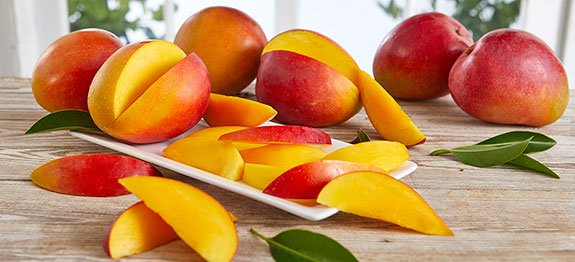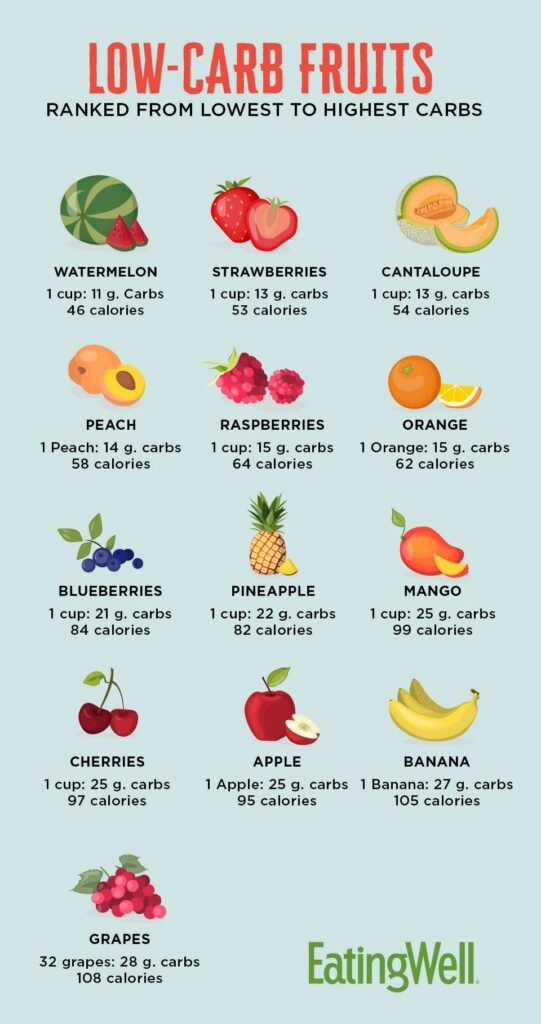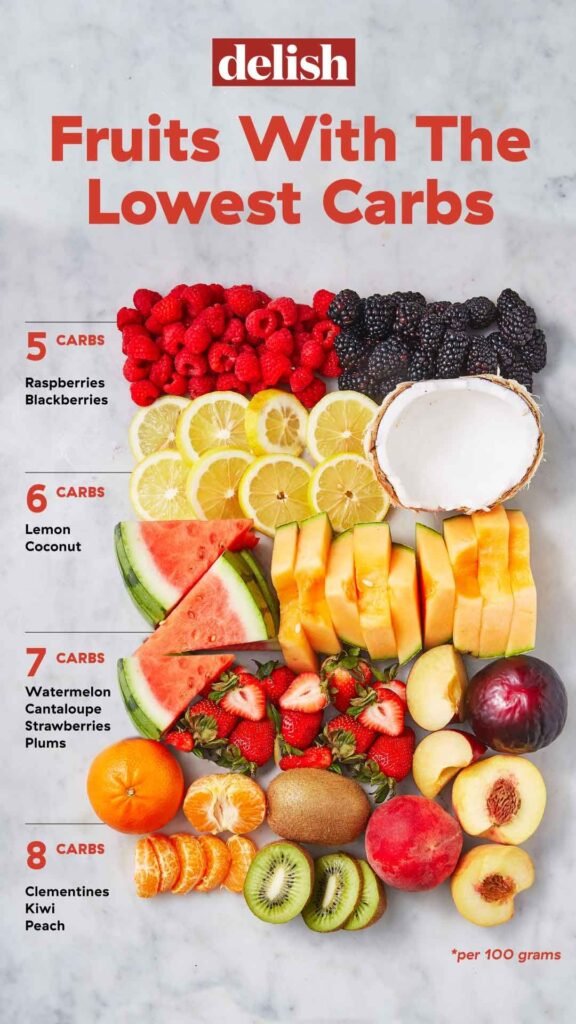Did you know that blueberries are not only a delicious and flavorful fruit, but they are also low in carbohydrates? Yes, you heard it right! Blueberries, those small, round, and vibrant fruits, are a healthy option for anyone looking to cut down on their carb intake. Packed with essential vitamins and antioxidants, these little blue powerhouses can satisfy your sweet cravings without causing a spike in your blood sugar levels. So if you’re watching your carb intake but still want to enjoy a tasty treat, blueberries are the perfect choice for you!
What are Blueberries?
Blueberries are small, round fruits that are known for their vibrant blue color and deliciously sweet taste. They belong to the genus Vaccinium and are classified as a “superfood” due to their numerous health benefits. Blueberries are native to North America but are now grown in many parts of the world. They are relatively low in carbohydrates, making them a great choice for those looking to follow a low carbohydrate diet.
Description
Blueberries are small fruits that range in size from a few millimeters to over a centimeter in diameter. They have a smooth skin and a juicy flesh that is typically blue or purple in color. The taste of blueberries can vary, but they are generally sweet with a slight tartness. They are often used in a variety of dishes, including desserts, smoothies, salads, and baked goods. Blueberries are also commonly eaten fresh as a healthy snack.
Nutritional Profile
Blueberries are not only low in carbohydrates but also rich in essential nutrients. A 1-cup serving of blueberries (148 grams) contains approximately:
- Calories: 84
- Carbohydrates: 21 grams
- Fiber: 4 grams
- Protein: 1 gram
- Fat: 0 grams
- Vitamin C: 24% of the daily recommended intake
- Vitamin K: 36% of the daily recommended intake
- Manganese: 25% of the daily recommended intake
- Antioxidants: Blueberries are packed with antioxidants, including anthocyanins, which give them their characteristic color. These antioxidants help protect the body against oxidative stress and inflammation, promoting overall health and well-being.
Carbohydrate Content in Blueberries
Total Carbohydrates
In a 1-cup serving of blueberries, there are 21 grams of carbohydrates. This makes blueberries a relatively low-carb fruit option compared to other fruits such as bananas or grapes. It is important to note that the carbohydrate content may vary slightly depending on the size and variety of the blueberries.
Fiber Content
Blueberries are an excellent source of dietary fiber, with 4 grams per 1-cup serving. Fiber is a type of carbohydrate that the body cannot digest, meaning it does not contribute to the net carbohydrate count. Fiber is known for its ability to promote digestive health, regulate blood sugar levels, and support weight management.

Benefits of Low Carbohydrate Consumption
Following a low carbohydrate diet can have numerous health benefits. Here are some of the key advantages of reducing your carbohydrate intake:
Weight Management
Consuming fewer carbohydrates can help with weight management. Carbohydrates are the body’s primary source of energy, and when consumed in excess, they can be stored as fat. By limiting carbohydrate intake, the body is forced to rely on stored fat for energy, which can lead to weight loss.
Blood Sugar Control
Restricting carbohydrates can also help control blood sugar levels, especially for individuals with diabetes or insulin resistance. Carbohydrates are broken down into glucose, which can cause a spike in blood sugar levels. By moderating carbohydrate intake, blood sugar levels can be better regulated.
Improved Gut Health
A low carbohydrate diet can promote a healthy gut microbiome. The gut microbiome refers to the trillions of bacteria that reside in the digestive tract and play a crucial role in overall health. By limiting carbohydrate intake, the growth of harmful bacteria can be inhibited while supporting the growth of beneficial bacteria.
Low Carbohydrate Diet
Definition
A low carbohydrate diet is a dietary approach that focuses on reducing the intake of carbohydrates, particularly those from sources such as grains, legumes, and starchy vegetables. Instead, the diet emphasizes consuming protein, healthy fats, and non-starchy vegetables.
Benefits
There are several benefits associated with following a low carbohydrate diet, including:
- Weight loss: Restricting carbohydrates can lead to weight loss by promoting the use of stored fat for energy.
- Improved blood sugar control: By moderating carbohydrate intake, blood sugar levels can be better managed, reducing the risk of diabetes and insulin resistance.
- Increased satiety: Consuming protein and healthy fats can help increase feelings of fullness and reduce overall calorie consumption.
- Lowered risk of heart disease: A low carbohydrate diet can lead to improvements in cardiovascular risk factors, such as blood pressure, cholesterol levels, and triglycerides.
Potential Risks
It is important to note that a low carbohydrate diet may not be suitable for everyone. Some potential risks of following a low carbohydrate diet include:
- Nutritional deficiencies: Restricting carbohydrate-rich foods can result in inadequate intake of essential nutrients, such as vitamins, minerals, and fiber. It is important to ensure a varied and balanced diet when reducing carbohydrates.
- Ketosis: Very low carbohydrate diets may induce a state of ketosis, where the body utilizes ketones for energy instead of glucose. While ketosis is generally safe, it may cause side effects such as bad breath, constipation, and fatigue.
- Sustainability: Some individuals may find it challenging to maintain a low carbohydrate diet in the long term due to the restrictive nature of the diet. It is important to find a dietary approach that is sustainable and enjoyable.
Impact of Blueberries in a Low Carbohydrate Diet
Low in Carbohydrates
Blueberries make an excellent addition to a low carbohydrate diet due to their relatively low carbohydrate content. With only 21 grams of carbohydrates per 1-cup serving, blueberries can be enjoyed while still maintaining a low carbohydrate intake.
Rich in Nutrients
Despite being low in carbohydrates, blueberries are packed with essential nutrients. They are a good source of vitamins C and K, as well as manganese, which is important for bone health and metabolism. Incorporating blueberries into a low carbohydrate diet ensures that you receive a variety of key nutrients.
Antioxidant Properties
Blueberries are well-known for their high antioxidant content. Antioxidants play a crucial role in neutralizing harmful free radicals in the body, protecting against oxidative stress and inflammation. Including blueberries in your low carbohydrate diet can help support overall health and well-being.
Incorporating Blueberries in a Low Carbohydrate Diet
Snack Option
Blueberries can be enjoyed as a tasty and nutritious snack on a low carbohydrate diet. Simply rinse and eat them fresh, or pair them with a source of protein, such as Greek yogurt or a handful of almonds, for a satisfying and balanced snack.
Smoothie Ingredient
Blueberries add a burst of flavor and nutrients to low carbohydrate smoothies. Blend them with low carbohydrate ingredients such as unsweetened almond milk, spinach, and a scoop of protein powder for a refreshing and nutritious smoothie option.
Salad Addition
Blueberries make a delightful addition to low carbohydrate salads. Toss them with mixed greens, sliced almonds, feta cheese, and a drizzle of balsamic dressing for a delicious and colorful salad that is both low in carbohydrates and packed with flavor.
Blueberry Recipes for Low Carbohydrate Diets
Blueberry Chia Pudding
Ingredients:
- 1 cup unsweetened almond milk
- 1/4 cup chia seeds
- 1/2 cup fresh blueberries
- 1 tablespoon honey or a low-carb sweetener (optional)
- 1/4 teaspoon vanilla extract
Instructions:
- In a bowl, whisk together almond milk, chia seeds, honey (if using), and vanilla extract.
- Let the mixture sit for 5 minutes to allow the chia seeds to absorb the liquid.
- Stir in the blueberries.
- Cover and refrigerate overnight or for at least 3 hours.
- Serve chilled, topped with additional blueberries if desired.
Blueberry Spinach Salad
Ingredients:
- 3 cups baby spinach
- 1/2 cup fresh blueberries
- 1/4 cup sliced almonds
- 2 tablespoons crumbled feta cheese
- 1 tablespoon balsamic vinaigrette
Instructions:
- In a large bowl, combine baby spinach, blueberries, sliced almonds, and crumbled feta cheese.
- Toss with balsamic vinaigrette until well coated.
- Serve immediately as a side salad or add grilled chicken or salmon for a complete meal.
Blueberry Smoothie Bowl
Ingredients:
- 1 cup frozen blueberries
- 1/2 cup unsweetened almond milk
- 1/4 cup plain Greek yogurt
- 1 tablespoon almond butter
- 1 tablespoon chia seeds
- Toppings of your choice (e.g., fresh blueberries, sliced almonds, coconut flakes)
Instructions:
- In a blender, combine frozen blueberries, almond milk, Greek yogurt, almond butter, and chia seeds.
- Blend until smooth and creamy.
- Pour the smoothie into a bowl and top with your favorite toppings.
- Enjoy with a spoon as a nutritious and satisfying breakfast or snack.
Other Low Carbohydrate Fruits
Strawberries
Strawberries are another delicious and low carbohydrate fruit option. They are rich in vitamin C, fiber, and antioxidants. A 1-cup serving of strawberries contains approximately 8 grams of carbohydrates.
Raspberries
Raspberries are low in carbohydrates and high in fiber. They are also a good source of vitamin C and antioxidants. A 1-cup serving of raspberries contains approximately 15 grams of carbohydrates.
Blackberries
Blackberries are a fantastic low carbohydrate fruit choice, packed with vitamins, fiber, and antioxidants. A 1-cup serving of blackberries contains approximately 14 grams of carbohydrates.
Conclusion
Blueberries are a delicious and low-carb option for anyone following a low carbohydrate diet. They are not only low in carbohydrates but also rich in essential nutrients and antioxidants. Incorporating blueberries into your diet can support weight management, blood sugar control, and overall gut health. Whether enjoyed as a snack, in smoothies, or as a salad addition, blueberries provide a burst of flavor and nutrition. So go ahead and indulge in this delightful fruit while maintaining a balanced and low carbohydrate lifestyle.
Incorporating Blueberries for a Balanced Diet
Blueberries are a versatile and nutritious fruit that can be enjoyed in many ways. From snacking on them fresh to adding them to smoothies and salads, there are endless possibilities to incorporate blueberries into your low carbohydrate diet. With their low carbohydrate content, rich nutrient profile, and antioxidant properties, blueberries are a delicious and healthy addition to any balanced diet. So why not start enjoying the benefits of blueberries today? Try out some of the recipes mentioned above and savor the taste of this incredible fruit while nourishing your body.




